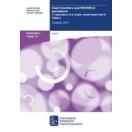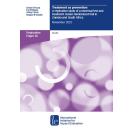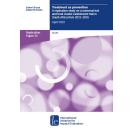
Cash transfers and HIV/HSV-2 prevalence: a replication of a cluster randomized trial in Malawi
3ie Replication paper 12
In this paper, Lynette Smith, Nick Hein and Danstan Bagenda conduct a replication study of the influential 2012 publication, Effect of a cash transfer programme for schooling on prevalence of HIV and herpes simplex type 2 in Malawi: a cluster randomised trial by Sarah Baird and others. The pure replication reproduced the results of the original paper with just a few minor discrepancies.
The cash transfer program was effective in reducing the prevalence of HIV and HSV-2 in unmarried school-aged girls currently attending school in Malawi. There was no significant reduction of HIV or HSV-2 prevalence for school-aged girls who dropped out of school. Additionally, there were no significant differences in the type of intervention, conditional versus unconditional cash transfer for school-aged girls currently attending school, except in one outcome, whether the school-aged girl was currently pregnant.
The replication researchers conducted a number of robustness checks of the publication. In their theory of change analysis, they examined a potential causal pathway for the intervention in reducing HIV and HSV-2 prevalence. The results show that the intervention is affecting HIV and HSV-2 prevalence partially through school enrollment and selected sexual behaviors.
In addition, they generate wealth index and HIV awareness variables to determine if the intervention effect differed depending on wealth or on HIV awareness. They determine HIV awareness is not related to the intervention. They found that the unconditional cash transfer compared to control is highly effective in reducing HSV-2 and HIV prevalence when family wealth (e.g. the mother alive or father is alive) is low.
In the measurement and estimation analysis, the replication researchers find the robustness of the results to be more sensitive to the model choice for HIV, where there were few cases, but less so with HSV-2. The replication researchers conclude that additional research should be performed to confirm the effectiveness of cash transfer programs in reducing HIV and HSV-2 prevalence.

